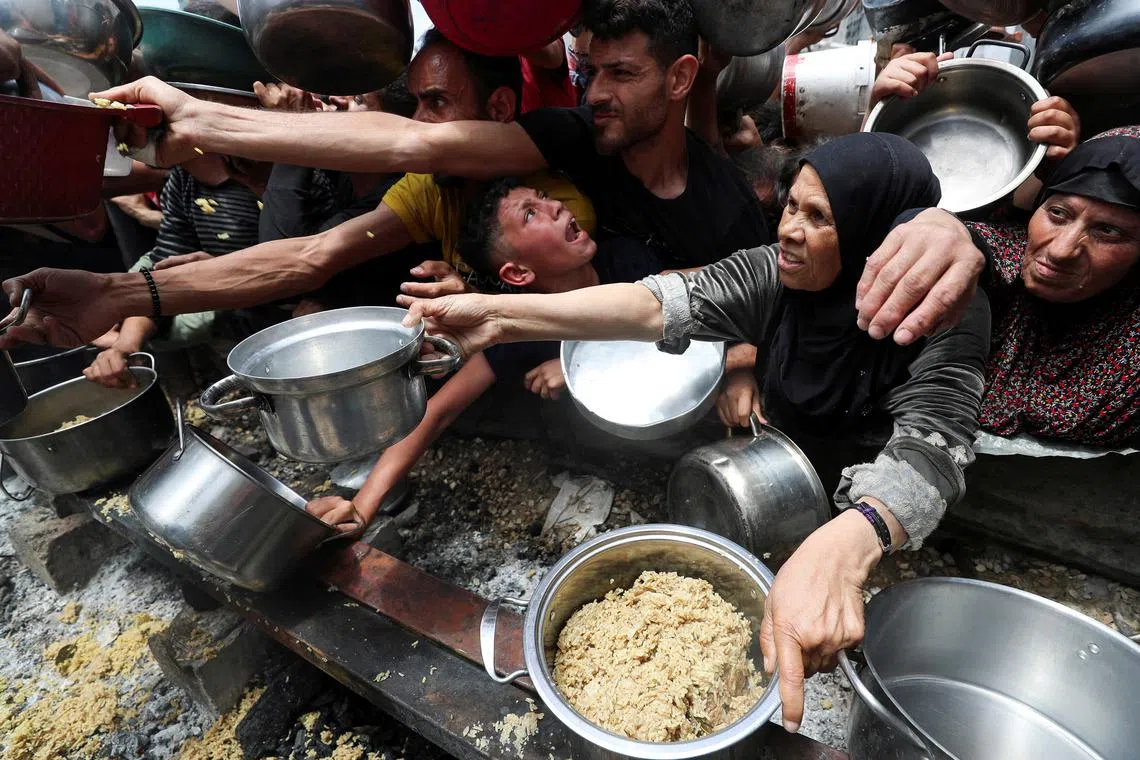US-backed aid group to start work in Gaza by end of May under heavily criticised plan
Sign up now: Get ST's newsletters delivered to your inbox

Palestinians rushing to receive food cooked by a charity kitchen in Jabalia, in the northern Gaza Strip, on May 14.
PHOTO: REUTERS
UNITED NATIONS/WASHINGTON – A US-backed humanitarian organisation will start work in Gaza by the end of May under a heavily criticised aid distribution plan, but has asked Israel to let the United Nations and others resume deliveries to Palestinians now until it is set up.
No humanitarian assistance has been delivered to Gaza since March 2, and a global hunger monitor has warned that half a million people face starvation – a quarter of the population in the enclave where Israel and Palestinian militant group Hamas have been at war since October 2023.
Israel has accused Hamas of stealing aid, which the group denies, and is blocking humanitarian deliveries to Gaza until Hamas releases all remaining Israeli hostages. Israel has said it backs “the American humanitarian plan”.
That plan was initiated by Israel and involves private companies – instead of the UN and aid groups – handing out assistance from a limited number of so-called secure distribution sites, which Israel said would be in Gaza’s south.
The newly created Gaza Humanitarian Foundation (GHF) will run the operation. US security firm UG Solutions and US-based Safe Reach Solutions, which does logistics and planning, would be involved in the foundation’s operation, said a source familiar with the plans, speaking on condition of anonymity.
Concerns
Washington has urged the UN and aid groups to cooperate with the GHF. However, they raised concerns that the operation would not stick to the long-held humanitarian principles of humanity, impartiality, independence and neutrality.
“We have made clear our problems with the sort of aid mechanism that’s been proposed,” deputy UN spokesman Farhan Haq said earlier on May 14, citing heavy criticism of the proposed operation by UN aid chief Tom Fletcher.
In a letter to Israel on May 14, GHF executive director Jake Wood sought to address some of the concerns.
He said the foundation would not share any personally identifiable information of aid recipients with Israel.
In a separate statement, GHF said Israel had agreed to expand the number of distribution sites “to serve the entire population of Gaza, and to find solutions for the distribution of aid to civilians” who are unable to reach a secure distribution site.
Israel’s mission to the UN declined to comment.
In his letter, Mr Wood asked Israel’s military to “identify and deconflict sufficient locations in northern Gaza capable of hosting GHF-operated secure distribution sites that can be made operational within 30 days”.
He also asked Israel to facilitate the flow of enough aid “using existing modalities” now until GHF’s infrastructure is fully operational, saying this was essential to “alleviate the ongoing humanitarian pressure, as well as decrease the pressure on the distribution sites” during the foundation’s first days of operation.
Following the GHF announcement, the International Committee of the Red Cross (ICRC) said concerns about the plan remained.
“Humanitarian aid should not be politicised nor militarised,” said ICRC spokeman Steve Dorsey. “The level of need among civilians in Gaza right now is overwhelming, and aid needs to be allowed to enter immediately and without impediment.” REUTERS


